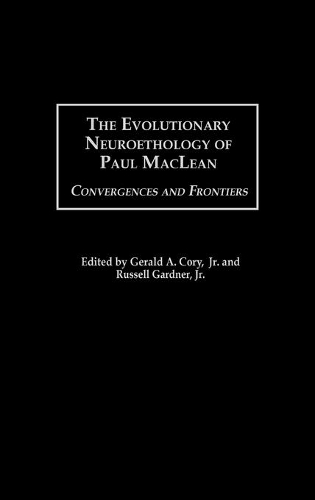
The Evolutionary Neuroethology of Paul MacLean: Convergences and Frontiers
(Hardback)
Publishing Details
The Evolutionary Neuroethology of Paul MacLean: Convergences and Frontiers
By (Author) Gerald A. Cory Jr.
Edited by Russell Gardner Jr.
Bloomsbury Publishing PLC
Praeger Publishers Inc
30th December 2002
United States
Classifications
Tertiary Education
Non Fiction
Neurology and clinical neurophysiology
612.82
Physical Properties
Hardback
472
Width 156mm, Height 235mm
765g
Description
Explores brain organization and the workings of social, economic, political, and care-taking systems. In the mid-20th century, integrative efforts began concerning the brain and its social and humanistic functions. These efforts were led by Paul D. MacLean's integrative research and thought. As the century ended, however, such efforts were lost in the surge of new effort in brain and genome research. Nobel Prizes were awarded on biochemical and cellular findings relevant to psychiatry. Findings on these levels seemed to provide ultimate answers. By contrast, Cory, Gardner, and their contributors provide a more comprehensive view by extending MacLean's findings and integrative theory. Supported by new findings and extended by critical analyses of current work, the collection provides foundations for more integrative efforts that the editors and contributors believe will prevail increasingly in coming decades. Looked at from another vantage point, therapeutic, social, economic, and politial sciences have proceeded without operating theories congruent with, or based on, brain functions. Across-species perspectives have been lacking. This collection redresses this problem and leads the way toward more comprehensive 21st century research on the one hand, and practical applications on the other. Multiple approaches extend from modeling efforts to across-species comparisons, to the basic science of psychiatry to theoretical explanations of political and economic systems. But most important, these essays abolish the Berlin wall that currently separates the brain from its social functions. A major guide for scholars, students, and researchers involved in the neurobehavioral sciences, for psychologists, psychiatrists, and others involved with human clinical sciences, and for social scientists concerned with the impact of the nervous system and its function.
Reviews
The Evolutionary Neuroethology of Paul MacLean will be of interest to a wide range of researchers concerned with the human brain, including psycologists and psychiatrists, neuroscientists, cognitive scientists, evolutionary anthropologists, and philosophers....Highly recommended for academic and health sciences libraries.-E-Streams
"The Evolutionary Neuroethology of Paul MacLean will be of interest to a wide range of researchers concerned with the human brain, including psycologists and psychiatrists, neuroscientists, cognitive scientists, evolutionary anthropologists, and philosophers....Highly recommended for academic and health sciences libraries."-E-Streams
Author Bio
GERALD A. CORY JR. is Director of the Center for Behavioral Ecology in San Jose, California, as well as Professor at San Jose State University. RUSSELL GARDNER JR. is Clinical Professor of Psychiatry at Wisconsin Medical College.
